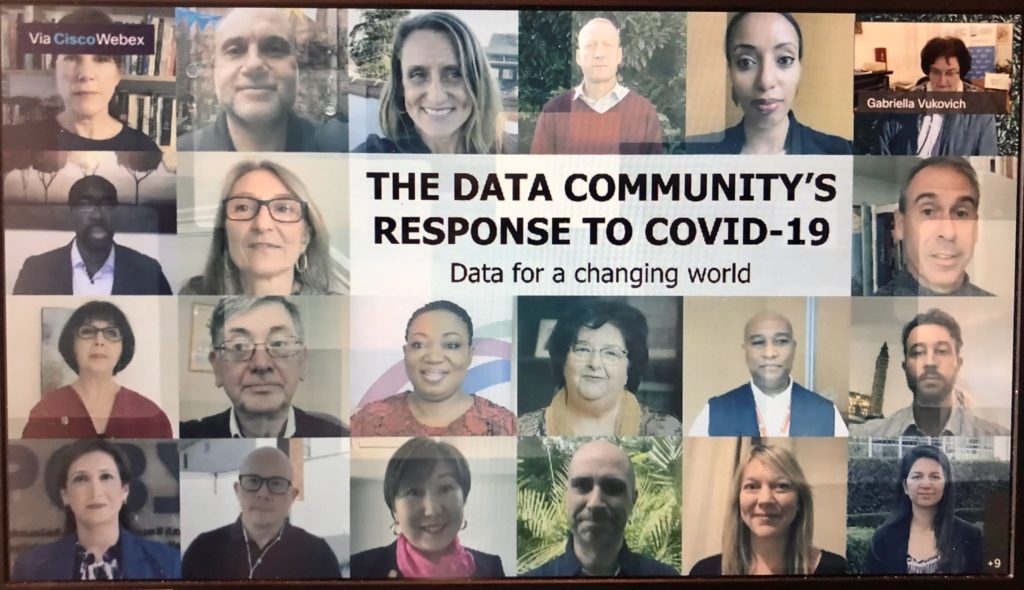This year’s UN World Data Forum did not go as any of us expected.
In-person meetings, workshops, and serendipitous hallway conversations were replaced by virtual meeting spaces with people joining at all hours of the day and night from their homes. The organizers of the first virtual World Data Forum did an incredible job pulling off this feat across a global range of time zones and technologies—arguably enabling the most inclusive forum yet.
But there was another way in which this year’s World Data Forum unfolded unexpectedly, and that was with respect to gender data. The Forum’s program included over 35 official live sessions, 32 pre-recorded panels, and many other side events, providing plenty of opportunities to engage in the many facets of data’s power to change lives.
However, though the offerings were plentiful, we couldn’t help but notice that out of almost 70 live and pre-recorded sessions, only one (Mind the Gap; Assessing Progress Towards Gender Equality with Innovative Approaches) seemed to explicitly cover gender data issues. In contrast, the first World Data Forum in Cape Town had two sessions, and the second Forum in Dubai had four sessions on gender data.
On the face of things, decreasing the number of sessions on gender data this year seemed like a step back. But our unease was unfounded; though the number of formal gender data sessions was small, many sessions across the program included strong discussions about the importance of prioritizing gender data and disaggregation by sex and other indicators.
Why is this important? Because these discussions of gender data across the program demonstrate that gender data is increasingly recognized as a central component of strong development data, not simply a niche topic that warrants a few panels, with no discussion outside of those sessions. This is an important and welcome shift because to truly make progress, we cannot address gender—much less gender data—in a silo.

In addition to widespread discussions of gender data, we also saw gender data prioritized across all audiences, rather than just by those steeped in the topic. The inclusion of gender data in remarks by UN agencies, governments, donors, academia, the private sector, media, and civil society signals a greater recognition that gender data is an integral part of quality data systems. The gender data movement—and its advocates—is steadily growing.
For example, right off the bat, multiple speakers made strong calls for data disaggregated by sex in the opening plenary and the opening high-level panel: Deputy Secretary-General Amina Mohammed, CEO of the Bill & Melinda Gates Foundation Mark Suzman, WHO Director General’s Special Envoy on COVID-19 Preparedness and Response David Nabarro, and Devex Editor-in-Chief Raj Kumar, all highlighted the need for sex-disaggregated data to understand the impact of COVID-19 on large segments of the world’s population, including women and girls.
There were also notable mentions of gender data at the session “Supporting better investments in development data—Mechanisms, actions, and perspectives,” where PARIS21’s Jurei Yada previewed the Bern Network’s Clearinghouse for Financing Development Data—a new platform to support the global supply and demand of financing for data and statistics. Speakers from the governments of Canada (Dominic Bourcier), Sweden (Anzee Hassanali), Switzerland (Thomas Gass), and from the Gates Foundation (Diva Dhar), all highlighted the importance of gender data and other forms of disaggregated data—for enabling governments and organizations to conduct better SDG monitoring, access best practices, and build partnerships.
The private sector also demonstrated its commitment to the gender data movement in the session “Private Sector Innovation for the SDGs,” with companies like Facebook (Anna Lerner Nesbitt) sharing the role tech companies can and are playing in closing gender data gaps.
These are just a few of the highlights illustrating the growing momentum of the gender data movement. Next year, at the 2021 UN World Data Forum in Bern, Switzerland, we’re hoping to engage with all of you in-person—and while we will certainly continue to advocate for gender data-specific sessions, we will deepen efforts to partner with everyone to integrate gender data across the program—and across data systems worldwide.
